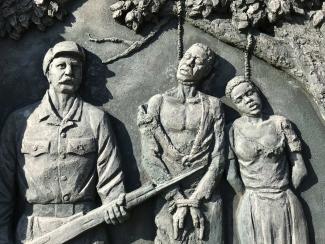Ovaherero and Nama genocide
No real reconciliation for the Ovaherero and Nama

In 2015, Germany rather half-heartedly acknowledged that genocide had been committed in the imperial colony of South West Africa between 1904 and 1908. However, it denied this admission of guilt had any legally valid consequences.
Since then, bilateral negotiations behind closed doors took place. On 21 May 2021 a Joint Declaration was initialled by the two special envoys. The coalition agreement of Germany’s new Federal Government referred to it as a “reconciliation agreement”. This euphemism was withdrawn in response to an interpellation in the German parliament on 12 October 2022.
Due to protests by Namibian civil society and opposition parties, the declaration’s adoption has been shelved and not yet signed by the foreign ministers. On 27 October 2022, Namibia’s Vice-President Nangolo Mbumba, who oversees the negotiations, stated that several points needed revision: the agreed amount of € 1.1 billion, the full and unrestricted recognition of the genocide, the acknowledgement of reparations and the inclusion of the descendants of the victim groups in the diaspora.
However, the main shortcoming must be addressed too. The main organisations of the descendants of the genocide-affected communities, the Ovaherero and Nama, but also the Damara and San, remained excluded from the talks.
On 9 November 2022, Germany’s Federal Government declared in parliament that there would be no new negotiations to amend the declaration. However, it was prepared to take some grievances into account by means of an addendum. Results remain to be seen.
Since then, opponents of the deal have taken further steps. In January 2023, the Ovaherero Traditional Authority, the Nama Traditional Leaders Association and the leader of the Landless People’s Movement (Namibia’s second largest opposition party) filed a lawsuit with the Windhoek High Court. They claim that the negotiations violate the Namibian constitution and a resolution adopted by parliament in 2006. The reason is that descendants of those directly affected were not involved in the negotiations.
Germany and Namibia violate rights
While the case is pending, their objections were supported by Special Rapporteurs of the UN Human Rights Council in letters sent to both governments on 23 February 2023. Indeed, the negotiations violated the UN Declaration on the Rights of Indigenous Peoples, which was adopted in September 2007 with the votes of Germany and Namibia. It states that “indigenous peoples have the right to participate in decisionmaking in matters which would affect their rights, through representatives chosen by themselves”. The rapporteurs also noted insufficient remembrance of the crimes committed and criticise that the Joint Declaration is no legal recognition of genocide and omits reparations.
Unsurprisingly, both the Namibian and German governments dismissed the criticism by referring to the intertemporal principle. This basically means that a law does not apply to events that happened before it took force. In doing so, they ignore relevant perspectives of international legal norms.
The declaration admits genocide using the words “from today’s perspective”. It avoids accepting responsibility and so shies away from the consequences that would follow. The doctrine of apology without compensation, coined by former German Foreign Minister Joschka Fischer some 20 years ago, seems to continue.
According to this approach, the declaration avoids the word “reparations”. It confirms the payment of € 1050 million over 30 years as a grant by Germany “dedicated to the reconstruction and development support programme for the benefit of the descendants of the particularly affected communities”. This is roughly the same amount allocated since independence as German development assistance (ODA) to Namibia. Another 50 million are for “projects on reconciliation, remembrance, research and education”. The implementation of both programmes rests with the two governments. It is agreed “that these amounts settle all financial aspects […] relating to the past addressed in this Joint Declaration”.
The declaration reinforces an asymmetrical power structure. The Namibian government is obviously the junior partner. The document states “Germany apologizes and bows before the descendants of the victims […] The Namibian Government and people accept Germany’s apology.” But the people have never been asked.
The descendants of the affected communities declare: If it is not with us, it is against us. In its present form, the declaration betrays justice. It makes the damage even greater. The German and Namibian governments should both be ashamed. Until negotiations are resumed in a transparent and inclusive process, giving the descendants not only a voice, but true co-ownership, there can be no reconciliation.
Sima Luipert is an activist in the Nama Traditional Leaders Association Technical Committee on Genocide and the great granddaughter of a Shark Island Concentration Camp survivor.
simagoeieman@gmail.com
Henning Melber came to Namibia as a son of German immigrants and joined the liberation movement Swapo in 1974.
henning.melber@nai.uu.se
Jephta Uavavaera Nguherimo is an author and founder of the OvaHerero People’s Memorial and Reconstruction Foundation (OPMRF).
jephta@hotmail.com










